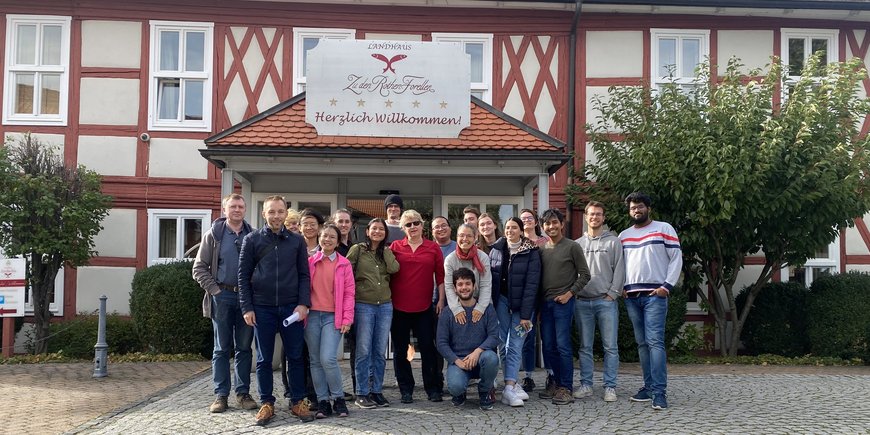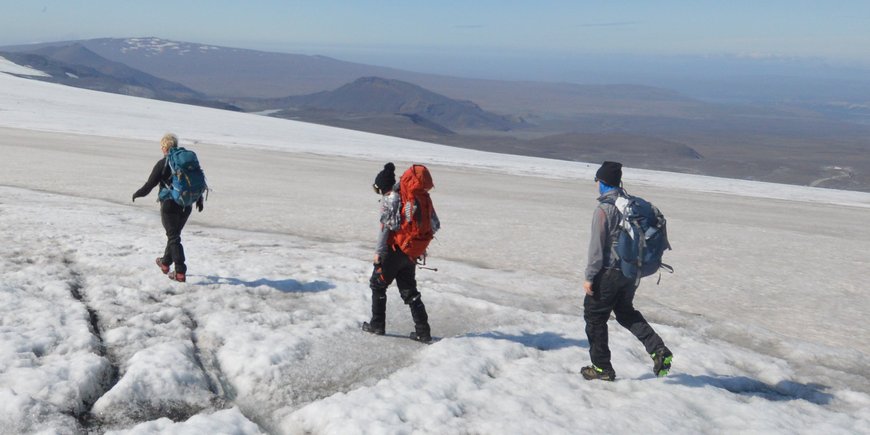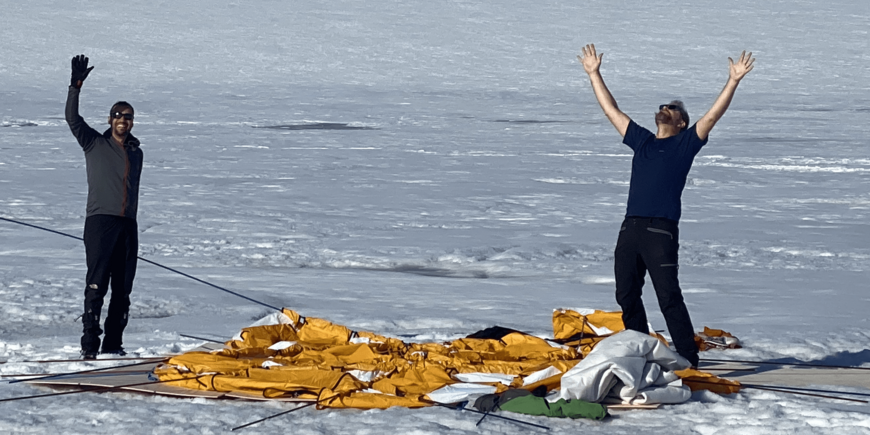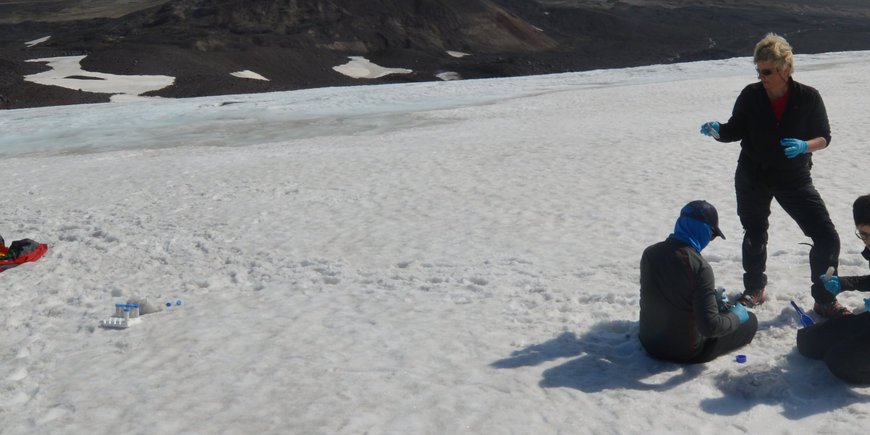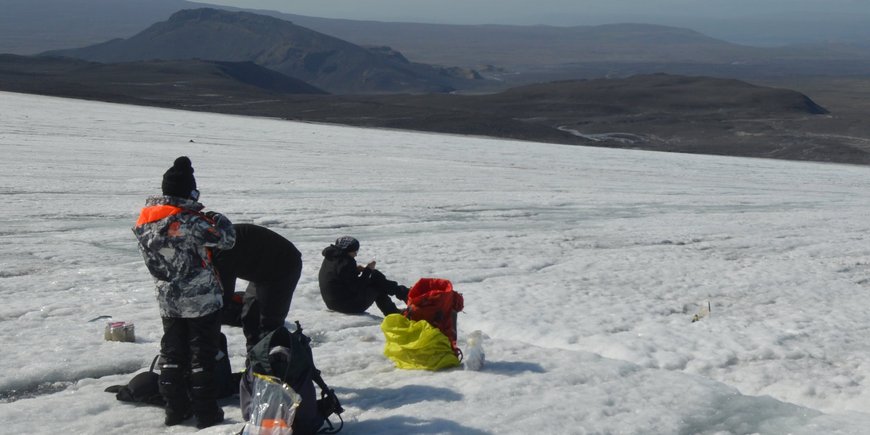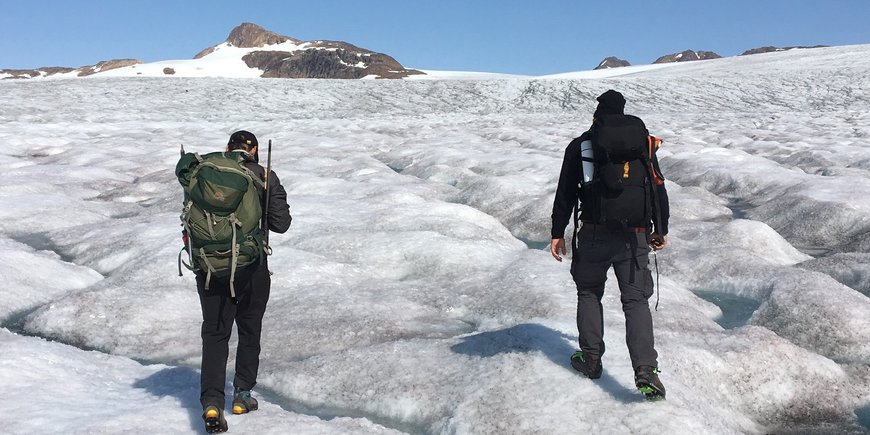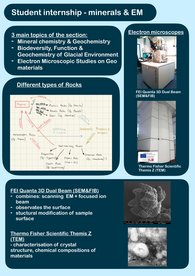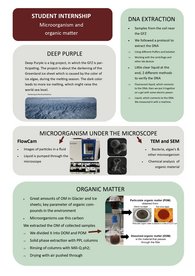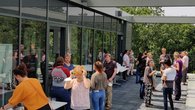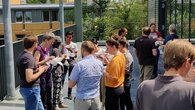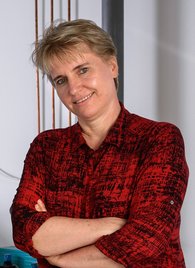
January 30, 2024
Congratulations to our section head, Liane G. Benning, for her appointment by the Federal President Frank-Walter Steinmeier as one of eight new members of the German Science and Humanities Council! She is also re-elected as member of the Review Board for Mineralogy, Petrology and Geochemistry for the 2024-2028 term of office.
December 18, 2023
Vera Roddatis and Robin Kreiser, 9th grade students at Humboldt-Gymnasium, did an internship in our section from November 20 to December 1. During their internship, they were provided with an overview of the research that we carry out in the group through lab tour and practical experiments. Their outputs are presented on the posters on the left.

April 21, 2023
Christoph Keuschnig has been awarded a prestigious Marie Skłodowska Curie Action (MSCA) Postdoctoral Fellowship to investigate the impact of fungal-bacterial interactions on soil structure formation. The highly competitive funding program provides the opportunity to carry out research abroad while transferring expertise knowledge between the host institution and the fellow.
More details can be found here.

Dr. Anke Neumann has recently joined Section 3.5 Interface Geochemistry as a Senior Humboldt Research Fellow. She will spend the next 12 months at GFZ, collaborating with Liane G. Benning and her team to investigate nano-sized minerals that result from the interaction of the common soil and sediment constituents ferrous iron and clay minerals.
More details can be found here.
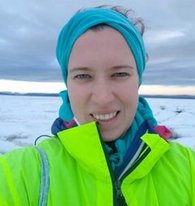
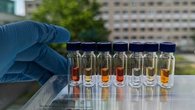
Congratulations to Elisa Katharina Peter who has been awarded a Student Sponsorship by the European Association of Geochemistry (EAG) this term. This sponsorship of 500 € will allow her to participate in the Practical Course on Metabolomics Bioinformatics for Life Scientists by the European Molecular Biology Organization (EMBO) at Wageningen University in October. The course is a fantastic opportunity to connect with and learn from leading scientists in the field of untargeted metabolomics. During the course, Elisa will also present her own research within the DEEP PURPLE project on the metabolic adaptations of glacier microbial communities that darken the Greenland Ice Sheet, thus intensifying surface melt.

Ruth Esther Delina is one of the recipients of the 2022 PhD Research Grant sponsored by Elsevier and the International Association of Geochemistry. This grant will support Ruth in her analyses involving atomic-scale investigation of chromium in mining-impacted nickel laterites. Congratulations, Ruth!
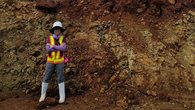
Congratulations to Ruth Esther Delina for being one of the two PhD students who were awarded with the TG Field Scholarship worth 800 CAD. The inaugural field scholarship is given by the TravelingGeologist.
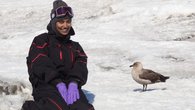
Runa Antony is among the 100 women in polar science and support featured on the Women in Polar Science website. You can read her story here.
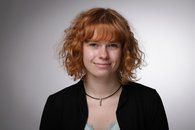
Congratulations to Rebecca Volkmann who has been granted with a bursary to attend the Zurich School of Crystallography at the Department of Chemistry, UZH University of Zurich. The School, organized by Prof. Anthony Linden and Prof. Hans-Beat Bürgi, will be held on the 19th - 30th June 2022. It will focus on small-molecule single-crystal X-ray structure determination, hence apt for young researchers in the field of molecular and solid state sciences. Rebecca is currently doing her PhD on the nucleation, growth and transformation kinetics of struvite.

Congratulations to Jeffrey Paulo Perez for receiving the Procope Mobility Grant (3.800 EUR) from the French Ministry for Foreign Affairs and International Development. The grant will fund his research visit to CNRS Géosciences Environnement Toulouse (GET). He will be working with Dr. Romain Guilbaud on iron and nutrient cycling in Early Earth oceans.

How organic molecules formed on Mars and other planets has long been the subject of controversy. Both biological and abiotic processes come into consideration. Now, measurements on the four-billion-year-old Martian meteorite Allan Hills (ALH) 84001, show that even at this early stage on Mars, abiotic reactions between rock and water led to the formation of organic carbon molecules. The researchers identified two possible but linked reaction pathways. This also allows conclusions to be drawn about the development of life on Earth. The study was led by Andrew Steele of the Carnegie Institution for Science in Washington D.C., USA, with the collaboration of Liane G. Benning of the German Research Centre for Geosciences Potsdam (GFZ), Germany, Diamond Light source in the UK as well as NASA and others. It has been published in the journal Science.
More details can be found here.
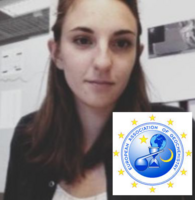
Congratulations to Thais Couasnon who has been granted with an ambassadorship support through the EAG Ambassadorship Program. This program aims at helping Europe-based Early Career Scientists who wish to attend conferences outside Europe. Thais will present her research, "The role of changing water chemistry during goethite dissolution under hydrated conditions", at the Gordon Research Seminar (January 29 - 30, 2022) and the Gordon Research Conference (January 30 - February 4, 2022) on liquid phase electron microscopy. The ambassadorship program will therefore allow Thais to represent geochemistry among the liquid phase electron microscopy community.

Today, Monday, June 21, the GFZ German Research Centre for Geosciences opened the "GeoBioLab" with a ceremony. The building was constructed in about two and a half years and cost 16.1 million euros. It offers laboratories and offices for two sections of the GFZ as well as a server room on slightly more than 1500 square meters of main floor space.
More details can be found here.

Mercury pollution is an issue of global concern due to its toxic effects. High levels have already been measured in Arctic organisms - with worrying effects on ecosystems and the food chain. So far, the Greenland Ice Sheet has not been taken into account as a part of the Arctic mercury cycle. Now, researchers led by Jon Hawkings of the German Research Centre for Geosciences in Potsdam and Florida State University show that meltwaters in the southwest of Greenland transport considerable amounts of mercury into the Arctic Ocean. Due to the large quantities detected, the researchers assume that they are of geological origin. They present their measurements in the current issue of Nature Geoscience.
More details can be found here.
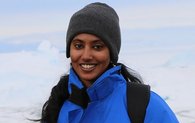
Dr. Runa Antony from the National Centre for Polar and Ocean Research, India has recently joined the “Interface Geochemistry" section 3.5 as a Humboldt Research Fellow. The Alexander von Humboldt Foundation awards Fellowships to scientists from abroad with above-average qualifications.
More details can be found here.

Congratulations are in order!
Robin Wojcik successfully defended his PhD last February 5, 2021. Great PhD defense with a grade of magna cum laude. Congratulations, Dr. Wojcik!
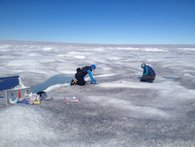
Researchers from the University of Leeds (UK) led by postdoctoral fellow Jenine McCutcheon (now University of Waterloo, Canada) and Liane G. Benning, German Research Centre for Geosciences Potsdam GFZ, have identified an important nutrient source for the glacier ice algae: phosphorus from locally generated mineral dust. This finding helps to better predict future developments of algal blooms and ice melt and to optimise climate models. The study was published today in Nature Communications.
More details can be found here.
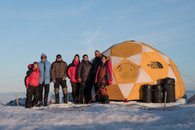
Deep Purple on Ice – Research on the Greenland Ice Sheet During the Pandemic
Insights into the EU project Deep Purple, fieldwork during the COVID-19 pandemic and doing research in a camp on the Greenland Ice Sheet. Written by Ph.D. students Rey Mourot(GFZ Potsdam), Laura Halbach (Aarhus University) and Eva Doting (Aarhus University).
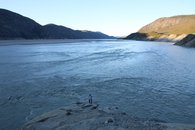
Trace elements such as iron, manganese and zinc are an integral part of the biogeochemical processes on the Earth's surface. As micronutrients, they play an essential role for the growth of all kinds of organisms and thus the Earth's carbon cycle. Below ice sheets, which cover around ten percent of the Earth's land surface, larger quantities of these substances are mobilised than previously assumed. This is shown by new data from Greenland and Antarctica, which were collected and analysed by an international research team led by Jon Hawkings from the GFZ German Research Centre for Geosciences in Potsdam and Florida State University (USA).
More details can be found here.
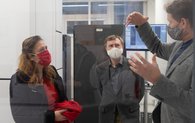
Together with the interim Scientific Director of the German Research Center for Geosciences, Prof. Dr. Niels Hovius, Brandenburg's Minister of Science, Dr. Manja Schüle, has now given the go-ahead for the commissioning of the new transmission electron microscope, which was supported by the federal state of Brandenburg with 2.8 million euros from the European Structural Funds (ERDF) and 500,000 euros from the GFZ.
More details can be found here.
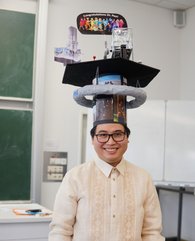
Congratulations to Dr. Jeffrey Paulo H. Perez who is awarded with the Friedrich-Robert-Helmert Prize 2020 for his doctoral thesis, "Green rust formation and reactivity with arsenic species".
More details can be found here.
__________________________________________________________________________________________
Congratulations are in order!
Jeffrey Paulo H. Perez successfully defended his PhD at the Freie Universität Berlin last 17th of January 2020. Great PhD defense with a grade of summa cum laude. Congratulations, Dr. Perez!
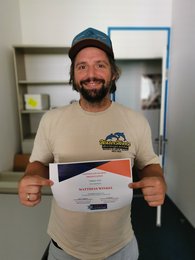
Congratulations to Matthias Winkel who has won the prize for “Best Arctic presentation” at the 6th APECS International Online Conference 2020 for his presentation “Seasonal Variation in Microbial Community Compositions and Functions on Icelandic Glacier”.

"A new study led by James Bradley of the German Research Centre for Geosciences GFZ and Queen Mary University of London provides a surprising answer: Microbes in the seabed survive on far less energy than has been shown ever before. The international team is publishing its results in the journal Science Advances."
More details can be found here.
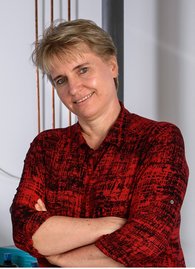
"Liane G. Benning has won the grant with the project "DEEP PURPLE". Together with colleagues, she is investigating the relationship between geology, geochemistry, biology and climate on the basis of the increasing algal bloom on Arctic snow and ice surfaces. On Greenland, the teams from Aarhus, Bristol and Potsdam are investigating how glacial algae grow and interact with their icy habitat. The pink to purple microorganisms darken the surface of the ice sheets and thus accelerate the melting of the glaciers."
More details can be found here.
__________________________________________________________________________________________
This is increasingly a problem in the Arctic, Alpine and Himalayan glaciers. Blooms of red snow and brown ice are turning up in Antarctica also." - The British newspaper @guardian featuring the @GFZ team including @LianeGBenning in an interesting piece on how algae increase the darkening and melting of the Greenland Ice Sheet: https://theguardian.com/environment/2019/sep/18/tiny-algae-ground-zero-greenland-melting-glaciers.
At the moment, we don't have any open positions.
For inquiries regarding potential fellowships please contact Prof. Liane G. Benning.


